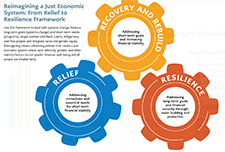Discover financial empowerment resources
Discover financial empowerment resources
Prosper Canada's comprehensive report, Closing the Divide: Solutions for Canada's Financial Help Gap, sets out clear steps governments, financial services, and community organizations can take to ensure every Canadian – no matter who they are or where they live – can access the financial help...
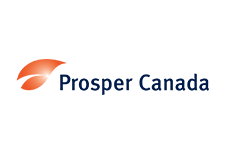
Canadians with low incomes lack access to the financial help they need to rebuild their financial health and resilience. Watch the webinar from September 17, 2025 as we present findings from our recent report: Closing the Divide: Solutions for Canada’s Financial Help Gap. Prosper Canada’s...
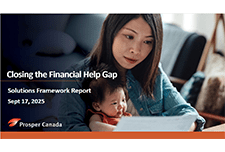
This report provides top-line data and insights on the financial resilience of Canadians living with low incomes based on the Institute’s Financial Well-Being Studies, Financial Resilience Index Model and Financial Well-Being Index Model linked to an Overall Well-Being Score. Based on data from...
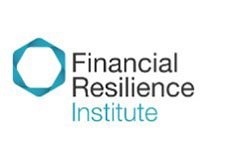
Women and girls are highlighted within Canada’s National Financial Literacy Strategy as a diverse population that can benefit from tailored approaches to strengthen financial resilience. To help close the gender gap, the Financial Consumer Agency of Canada (FCAC) developed and tested the benefits...

Savings are one of the strongest predictors of household financial resilience and well-being, yet Canadian households struggle to save due to an array of economic, behavioural and institutional factors. The Financial Consumer Agency of Canada (FCAC) created the National Financial Literacy...

Community organizations play a vital role in supporting people. In these difficult economic times, helping community members strengthen their financial literacy and build their financial resilience is essential for helping them to navigate financial challenges. Building on Financial Consumer...
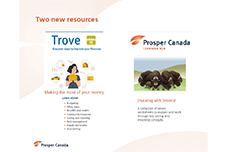
This Financial Resilience Institute report, authored by Eloise Duncan and commissioned by FP Canada and the Institut québécois de planification financière (IQPF) is being published for everyone with a stake in the financial resilience and well-being of Canadians. This study, leveraging the...

Among the truly urgent crises facing the United States is widespread household financial insecurity. A stunning 51% of U.S. households have expenses that are at least equal to—if not greater than—their income, and 55% lack the necessary savings to weather a simultaneous income drop and expense...

This presentation at the Canadian Economics Association by Professor Annamaria Lusardi, looks at how we measure financial literacy, how we measure the impact of financial literacy on behaviour, how this data and these findings may be used to design policy and programs and what the implications for...
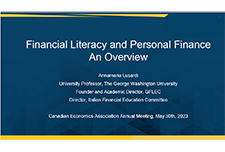
Widespread household financial insecurity is an undeniably urgent crisis in the United States today. A stunning 51 percent of U.S. households have expenses that are equal to or greater than their income, and 55 percent lack the necessary savings to weather a simultaneous income drop and expense...
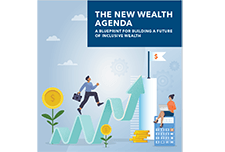
The Asset Funders Network engages philanthropy to advance equitable wealth building and economic mobility. For 18 years, AFN has provided a forum for grantmakers to connect, collaborate, and collectively invest in helping more people achieve economic security. This report reflects their work over...
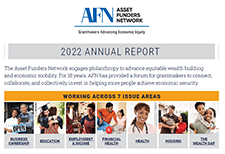
For most households in America, financial shocks are inevitable. The car will break down. The house will need a repair. A key earner for a household will be laid off. These shocks can be devastating to household finances. And while the COVID-19 pandemic, which we are still recovering from, was a...
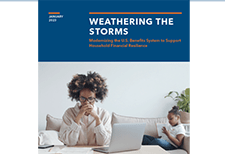
Managing your finances means finding the right balance. Inflation and higher interest rates signal that you may need to adjust your budget to find the right balance between daily spending and paying down debt. The right balance will depend on your financial situation and goals. This selection of...
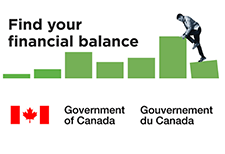
In honor of Black History Month, BestColleges in the United States interviewed financial expert Terrance Dedrick to help curate a financial literacy resource for Black and African Americans. This article includes links to these organizations in the United States that cater to Black and African...

The ballooning cost of living has had a disproportionate impact on low-income households, 77.6% of whom are financially vulnerable or extremely financially vulnerable. Prosper Canada's recently commissioned study from the Financial Resilience Institute, shows the unarguable deteriorating state of...

The Financial Consumer Agency of Canada’s (FCAC) COVID-19 Financial Well-being Survey, which began in August 2020, is a nationally representative hybrid online-phone survey fielded monthly, with approximately 1,000 respondents per month. The survey collects information on Canadians’ day-to-day...
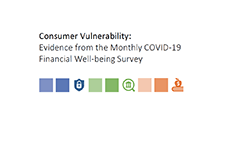
This report is about the financial resilience and financial well-being of Canadians with low incomes based on the Seymour Financial Resilience Index ® It provides a call to action for more targeted support from policymakers, financial institutions and community non profit organizations for...
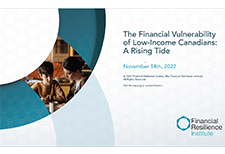
AFN's 2021 Annual Report gives a high level review of our work last year, including some snapshots into the place-based initiatives in our regions. Across our regions, AFN is working with grantmakers on collaborative efforts to advance equitable wealth building and economic mobility. One example...
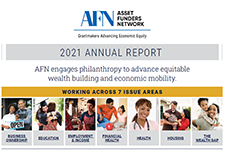
Recover and Rebuild: Helping Canadians build financial security during the pandemic and beyond The 2021 ABLE Financial Empowerment (FE) virtual series is a collection of online financial empowerment events designed to provide frontline FE practitioners, FE stakeholders, policy-makers and...

This webinar hosted by FCAC (originally broadcast on November 17, 2021) targets women who want to learn more about managing money and building saving habits. Guest speaker, personal financial expert, Rubina Ahmed-Haq has also contributed to Canada's financial literacy blog on "Women face unique...

The coronavirus pandemic has tested the limits of Canadians over the past 20 months. What began as a health crisis quickly morphed into an economic crisis, with the spread of COVID‑19 shocking large segments of the economy and leaving many without paycheques. While no generation has been...

The financial resilience and financial well-being of Canadians with low incomes: Insights and analysis to support the financial empowerment sector detailed report, provides data and insights on the financial impact of the pandemic on Canadians with low incomes and their financial health, resilience...
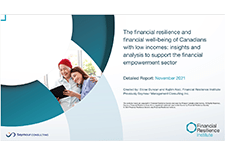
The Financial Consumer Agency of Canada’s (FCAC’s) mandate is to protect Canadian financial consumers and strengthen financial literacy. The National Strategy is a 5-year plan to create a more accessible, inclusive, and effective financial ecosystem that supports diverse Canadians in...
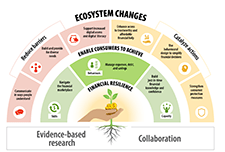
Recover and Rebuild: Helping Canadians build financial security during the pandemic and beyond The 2021 ABLE Financial Empowerment (FE) virtual series is a collection of online financial empowerment events designed to provide frontline FE practitioners, FE...
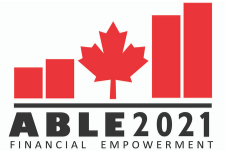
The events of 2020 revealed unvarnished truths that demand that philanthropic organizations take action to build economic well-being for all. This long-overdue moment emphasizes the critical need for strategies that provide a range of support to women and Black, Latinx,...
